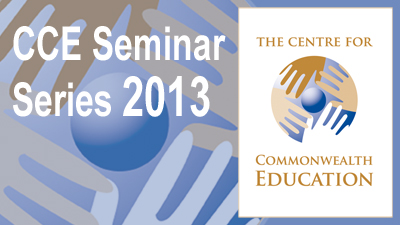The Economics of Religion in India
Duration: 28 mins 57 secs
Share this media item:
Embed this media item:
Embed this media item:
About this item

| Description: | A presentation given as part of CCE's Education in India: A Multidisciplinary Exploration which discusses a study into religious and non-religious service provision by religious organisations in India. |
|---|
| Created: | 2014-02-25 14:40 | ||||
|---|---|---|---|---|---|
| Collection: | Centre for Commonwealth Education: Seminars | ||||
| Publisher: | University of Cambridge | ||||
| Copyright: | Centre for Commonwealth Education, University of Cambridge | ||||
| Language: | eng (English) | ||||
| Keywords: | CCE; Centre for Commonwealth Education; Education in India; Economics of Education; Economics of Religion; Dr. Sriya Iyer; | ||||
| Credits: |
|
||||
| Abstract: | Ever wondered about the wider impact of religion in India and about its effect on economic development? Although India is becoming more wealthy, rising social inequality, especially in poorer states, often causes religious organisations to step in to the breach left by the lack of public provision, especially in the areas of education and healthcare. This talk examines religious and non-religious service provision by religious organizations in India, the manner in which religious organisations are diversifying and their economic impact. An economic model shows how religious competition and economic inequality encourage organizations to differentiate their strength of religious beliefs and increase their non-religious services to retain adherents. To test our model, we present unique primary survey data on the economics of religion, collected between 2006 and 2008 from 568 Hindu, Muslim, Christian, Sikh and Jain religious organizations spread across 7 Indian states. The data demonstrate that these organizations have substantially increased their provision of religious and non-religious services. We also provide evidence based on econometric testing to highlight that religious organizations are differentiating themselves on the strength of religious beliefs with respect to other organizations, and are also providing higher education and health services as economic inequality increases in India. |
|---|---|

